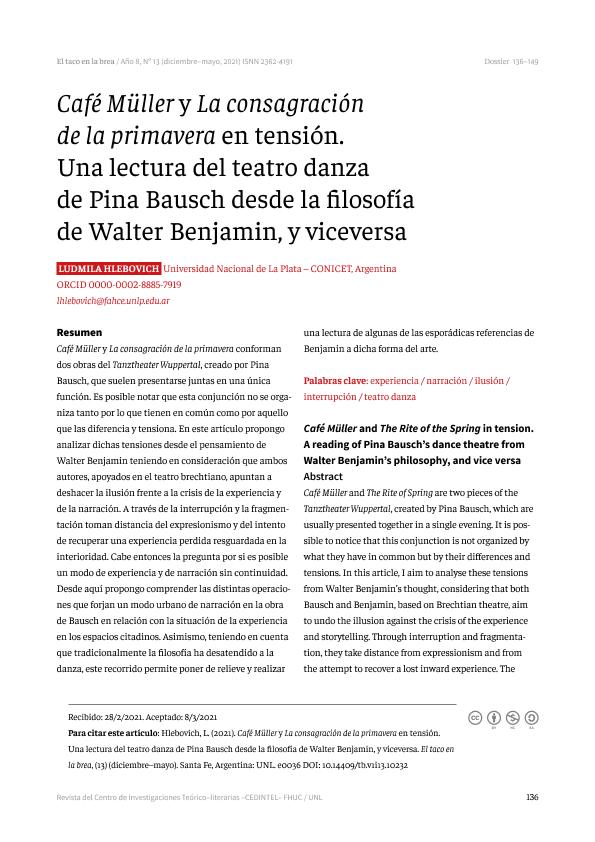Mostrar el registro sencillo del ítem
dc.contributor.author
Hlebovich, Ludmila

dc.date.available
2022-09-01T13:01:17Z
dc.date.issued
2021-04-23
dc.identifier.citation
Hlebovich, Ludmila; Café Müller y La consagración de la primavera en tensión. Una lectura del teatro danza de Pina Bausch desde la filosofía de Walter Benjamin, y viceversa; Universidad Nacional del Litoral. Facultad de Humanidades y Ciencias. Centro de Investigaciones Teórico–literarias; El Taco en la Brea; 1; 13; 23-4-2021; 136-149
dc.identifier.issn
2362-4191
dc.identifier.uri
http://hdl.handle.net/11336/167137
dc.description.abstract
Café Müller y La consagración de la primavera conforman dos obras del Tanztheater Wuppertal, creado por Pina Bausch, que suelen presentarse juntas en una única función. Es posible notar que esta conjunción no se organiza tanto por lo que tienen en común como por aquello que las diferencia y tensiona. En este artículo propongo analizar dichas tensiones desde el pensamiento de Walter Benjamin teniendo en consideración que ambos autores, apoyados en el teatro brechtiano, apuntan a deshacer la ilusión frente a la crisis de la experiencia y de la narración. A través de la interrupción y la fragmentación toman distancia del expresionismo y del intento de recuperar una experiencia perdida resguardada en la interioridad. Cabe entonces la pregunta por si es posible un modo de experiencia y de narración sin continuidad. Desde aquí propongo comprender las distintas operaciones que forjan un modo urbano de narración en la obra de Bausch en relación con la situación de la experiencia en los espacios citadinos. Asimismo, teniendo en cuenta que tradicionalmente la filosofía ha desatendido a la danza, este recorrido permite poner de relieve y realizar una lectura de algunas de las esporádicas referencias de Benjamin a dicha forma del arte.
dc.description.abstract
Café Müller and The Rite of Spring are two pieces of the Tanztheater Wuppertal, created by Pina Bausch, which are usually presented together in a single evening. It is possible to notice that this conjunction is not organized by what they have in common but by their differences and tensions. In this article, I aim to analyse these tensions from Walter Benjamin’s thought, considering that both Bausch and Benjamin, based on Brechtian theatre, aim to undo the llusion against the crisis of the experience and storytelling. Through interruption and fragmentation, they take distance from expressionism and from the attempt to recover a lost inward experience. The following question then arises: is it possible a mode of experience and storytelling without continuity? I suggest a reading of the different manoeuvres that help forge an urban mode of storytelling in Bausch’s work concerning the situation of experience in urban spaces. Likewise, taking into account that philosophy has traditionally neglected dance, this reconstruction allows to highlight and interpret some of Benjamin's sporadic references to this art form.
dc.format
application/pdf
dc.language.iso
spa
dc.publisher
Universidad Nacional del Litoral. Facultad de Humanidades y Ciencias. Centro de Investigaciones Teórico–literarias
dc.rights
info:eu-repo/semantics/openAccess
dc.rights.uri
https://creativecommons.org/licenses/by-nc-sa/2.5/ar/
dc.subject
EXPERIENCIA
dc.subject
NARRACIÓN
dc.subject
ILUSIÓN
dc.subject
INTERRUPCIÓN
dc.subject
TEATRO DANZA
dc.subject.classification
Filosofía, Historia y Filosofía de la Ciencia y la Tecnología

dc.subject.classification
Filosofía, Ética y Religión

dc.subject.classification
HUMANIDADES

dc.title
Café Müller y La consagración de la primavera en tensión. Una lectura del teatro danza de Pina Bausch desde la filosofía de Walter Benjamin, y viceversa
dc.title
Café Müller and The Rite of the Spring in tension. A reading of Pina Bausch’s dance theatre from Walter Benjamin’s philosophy, and vice versa
dc.type
info:eu-repo/semantics/article
dc.type
info:ar-repo/semantics/artículo
dc.type
info:eu-repo/semantics/publishedVersion
dc.date.updated
2022-08-10T15:49:00Z
dc.journal.volume
1
dc.journal.number
13
dc.journal.pagination
136-149
dc.journal.pais
Argentina

dc.journal.ciudad
Santa Fe
dc.description.fil
Fil: Hlebovich, Ludmila. Consejo Nacional de Investigaciones Científicas y Técnicas. Centro Científico Tecnológico Conicet - La Plata. Instituto de Investigaciones en Humanidades y Ciencias Sociales. Universidad Nacional de La Plata. Facultad de Humanidades y Ciencias de la Educación. Instituto de Investigaciones en Humanidades y Ciencias Sociales; Argentina
dc.journal.title
El Taco en la Brea
dc.relation.alternativeid
info:eu-repo/semantics/altIdentifier/url/https://bibliotecavirtual.unl.edu.ar/publicaciones/index.php/ElTacoenlaBrea/article/view/10232
dc.relation.alternativeid
info:eu-repo/semantics/altIdentifier/doi/https://doi.org/10.14409/tb.v1i13.10232
Archivos asociados
